Innovation and commercialization are similar yet vastly different. You can have an abundance of ideas, but having the structured process in place to bring them to fruition is key. The path to commercialization is littered with potholes and roadblocks, but you don’t have to navigate them alone.
Often the process of moving a product idea out of the “idea” stage is challenging, so many inventors tend to discard the idea and move on. However, with the right resources and structure in place, you can get your idea off the ground and headed towards commercialization.
“It’s not about ideas. It’s about making ideas happen.” – Scott Belsky, co-founder of Behance.
Below are a few items to consider when developing the support structure for your business.
- Community Resources. Look around at your local community and see what resources are in place to help you develop your business idea. Depending on your idea you might be searching for a tech incubator, a business accelerator, mentoring, training programs or networking events. While many inventors dream of building a business in Silicon Valley, the truth is that your local community might be the best place for you to start.
- Service Providers. In line with community resources, your local tech incubator or accelerator will be able to put you in touch with professionals in your community. For example, product development experts, programmers, lawyers, CPAs etc. Incubators and accelerators will have knowledge and experience working with these service providers, and be able to guide you toward the ones that meet your specific business needs.
- Funding. Most startups need funding at one point. This assistance might come in the form of grants, venture capitalists, tax breaks or R&D funding. Research what type of funding makes the most sense for your business and your goals.
- Intellectual Property. Patent research should not be overlooked at the very early stages of forming your business. Before you get going and commit yourself to developing a product, you want to be sure that someone else does not hold the rights to it. (Take a look at how Herbavore, a startup client of ours, approached the entire patent process.)
Often times inventors and entrepreneurs are viewed as people who lock themselves away to develop an idea, but the truth of the matter is, it takes help from a wide range of people to get an idea on the road to commercialization. Don’t be afraid to reach out and ask for help. If you need a certain skill set that you don’t possess, find someone who does—asking for help might just be the thing that sets your idea on the path to success.
_______
3D Innovations is a Product Development Company – from the 3D Design to a fully functional 3D Prototype & Product.
Subscribe to the 3D Innovations newsletter on our Facebook page!

